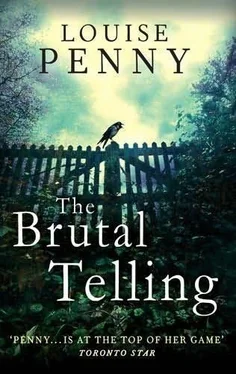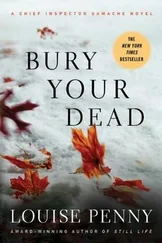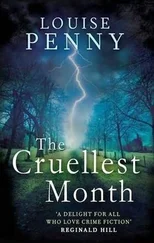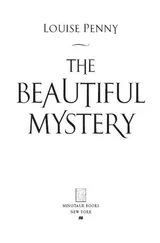“So the Varathane on the dead man’s clothing didn’t come from the old Hadley house,” said the Chief, disappointed. It had seemed a promising lead.
“Why’re we here?” Beauvoir asked as they turned back to survey the gently subsiding home and the rusting pickup truck in the yard. He’d received a call from the Chief to meet him here, but he didn’t know why.
Gamache explained what Old Mundin had said about Olivier, Madame Poirier and her furniture. Specifically the Chippendale chairs.
“So her kids think Olivier screwed her? And by extension, them?” asked Beauvoir.
“Seems so.” He knocked on the door. After a moment a querulous voice called through it.
“Who is it?”
“Chief Inspector Gamache, madame. Of the Sûreté du Québec.”
“I ain’t done nothing wrong.”
Gamache and Beauvoir exchanged glances.
“We need to speak to you, Madame Poirier. It’s about the body found in the bistro in Three Pines.”
“So?”
It was very difficult conducting an interview through an inch of chipping wood.
“May we come in? We’d like to talk to you about Olivier Brulé.”
An elderly woman, small and slender, opened the door. She glared at them then turned and walked rapidly back into the house. Gamache and Beauvoir followed.
It was decorated as Beauvoir had imagined. Or, really, not decorated. Things were put up on the walls as they’d arrived, over the generations, so that the walls were a horizontal archaeological dig. The farther into the house they went, the more recent the items. Framed flowers, plasticized place mats, crucifixes, paintings of Jesus and the Virgin Mary, and yes, spoons, all marched across the faded floral wallpaper.
But the place was clean, spotless and smelled of cookies. Photos of grandchildren, perhaps even great-grandchildren, sat on shelves and tabletops. A faded striped tablecloth, clean and ironed, was on the kitchen table. And in the center of that table was a vase containing late summer flowers.
“Tea?” She lifted a pot from the stove. Beauvoir declined but Gamache accepted. She returned with cups of tea for them all. “Well, go on.”
“We understand Olivier bought some furniture from you,” said Beauvoir.
“Not just some. He bought the lot. Thank God. Gave me more than anyone else would, despite what my kids mighta told you.”
“We haven’t spoken to them yet,” said Beauvoir.
“Neither have I. Not since selling the stuff.” But she didn’t seem upset. “Greedy, all of them. Waiting for me to die so they can inherit.”
“How did you meet Olivier?” Beauvoir asked.
“He knocked on the door one day. Introduced himself. Asked if I had anything I’d like to sell. Sent him running the first few times.” She smiled at the memory. “But there was something about him. He kept coming back. So I eventually invited him in, just for tea. He’d come about once a month, have tea, then leave.”
“When did you decide to sell to him?” Beauvoir asked.
“I’m coming to that,” she snapped, and Beauvoir began to appreciate how hard Olivier must have worked for that furniture.
“One winter was particularly long. Lots of snow. And cold. So I decided to hell with this, I’d sell up and move into Saint-Rémy, to that new seniors’ home. So I told Olivier and we walked through the house. I showed him all that crap my parents left me. Old armoires and dressers. Big pine things. And painted all sorts of dull colors. Blues and greens. Tried to scrape it off some of them, but it was no good.”
Beside him Beauvoir heard the Chief inhale, but that was the only sign of pain. Having spent years with Gamache he knew his passion for antiques, and knew that you never, ever strip old paint. It was like skinning something alive.
“So you showed it all to Olivier? What did he say?”
“Said he’d take the lot, including what was in the barn and attic without even seeing it. Tables and chairs been there since before my grandparents. Was going to send it to the dump, but my lazy sons never showed up to do it. So serves them right. I sold the lot to Olivier.”
“Can you remember how much you got?”
“I remember exactly. It was three thousand two hundred dollars. Enough to pay for all of this. Sears.”
Gamache looked at the legs of the table. Prefabricated wood. There was an upholstered rocker facing the new television, and a dark wood-veneer cabinet, with decorative plates.
Madame Poirier was also looking at the contents of the room, with pride.
“He came by a few weeks later and you know what he’d brought? A new bed. Plastic still on the mattress. Set it up for me too. He still comes by sometimes. He’s a nice man.”
Beauvoir nodded. A nice man who’d paid this elderly woman a fraction of what that furniture was worth.
“But you’re not in the seniors’ home? Why not?”
“After I got the new furniture the place felt different. More mine. I kinda liked it again.”
She showed them to the door and Beauvoir noticed the welcome mat. Worn, but still there. They said good-bye and headed for her eldest son’s place a mile down the road. A large man with a gut and stubble opened the door.
“Cops,” he called into the house. It, and he, smelled of beer and sweat and tobacco.
“Claude Poirier?” Beauvoir asked. It was a formality. Who else would this man be? He was nearing sixty, and looked every moment of it. Beauvoir had taken the time before leaving the Incident Room to look up the Poirier family. To see what they were walking into.
Petty crimes. Drunk and disorderly. Shoplifting. Benefit fraud.
They were the type who took advantage, found fault, pointed fingers. Still, it didn’t mean that sometimes they weren’t right. Like about Olivier. He’d screwed them.
After the introductions Poirier launched into his long, sad litany. It was all Beauvoir could do to keep him focused on Olivier, so long was this man’s list of people who’d done him wrong. Including his own mother.
Finally the two investigators lurched from the stale house, taking deep breaths of fresh late afternoon air.
“Do you think he did it?” asked Gamache
“He’s certainly angry enough,” said Beauvoir, “but unless he could transport a body to the bistro using the buttons on his remote, I think he’s off the suspect list. Can’t see him getting off that stinking sofa long enough.”
They walked back to their cars. The Chief paused.
“What’re you thinking?” Beauvoir asked.
“I was remembering what Madame Poirier said. She was about to take all those antiques to the dump. Can you imagine?”
Beauvoir could see that the thought gave Gamache actual pain.
“But Olivier saved them,” said the Chief. “Strange how that works. He might not have given Madame enough money, but he gave her affection and company. What price do you put on that?”
“So, can I buy your car? I’ll give you twenty hours of my company.”
“Don’t be cynical. One day you might be elderly and alone and you’ll see.”
As he followed the Chief’s car back to Three Pines Beauvoir thought about that, and agreed that Olivier had saved the precious antiques, and spent time with the crabby old woman. But he could have done it and still given the old woman a fair price.
But he hadn’t.
Marc Gilbert looked at Marc the horse. Marc the horse looked at Marc Gilbert. Neither seemed pleased.
“Dominique!” Marc called from the door of the barn.
“Yes?” she said, cheerily, walking across the yard from the house. She’d hoped it would take Marc a few days to find the horses. Actually, she’d hoped he never would. But that was in the same league as the Mrs. Keith Partridge dream. Unlikely at best.
Читать дальше











